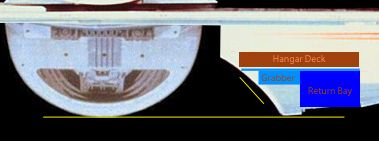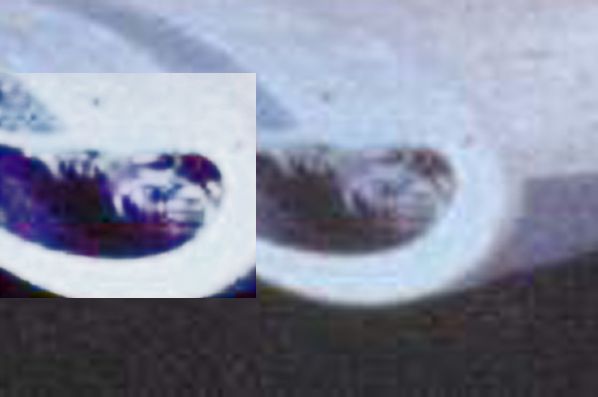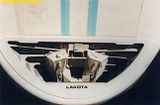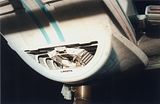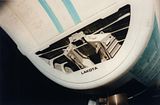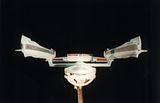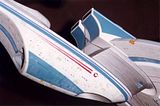So, I was reading the
Memory Alpha writeup on the design process of the
Excelsior model posted by
Tomalak in the
Oberth thread... which I don't think I've ever actually bothered to read. (Or at least not for a few years.)

Most of it includes things we've discussed in bits and pieces already; the design process of multiple study models arising from multiple sketches, Bill George's Japanese take, the use of the study models in TNG, and a bit more.
One statement stood out to me regarding the changes made for TUC:
Bill George said:
"We changed the bridge on the Excelsior model because on this show, the bridge is actually very small – it's the Enterprise bridge re-dressed. The Excelsior was originally built for Star Trek III, where it had a cavernous bridge, and the model had a big bubble on top which I felt was always out of scale. We replaced it with a smaller bridge area which helped the overall scale of the model."
So, for me that more or less proves it: ILM always meant the ship to be bigger than her official 467 meter size. (Granted, the actual bridge would never fit into the smaller dome of the TUC model, but we could, as others have done, pretend it's actually round like that of the
Enterprise rather than elliptical.)
And what's more, while the original round dome actually somewhat fits the 467 meter size if we submerge the bridge within the deck, it appears Mr. George felt that original dome was out of scale with the rest of the ship.
After studying Drexler's cutaway more, I've concluded that he made his decks a bit too short. So I think I need to revisit my own original effort if I want to see what the size of the model as scaled would be.
This of course provokes the next logical question: what size is the ship
really in the Trekverse, the size that seems to be suggested by the model, or the size that has been accepted?
The problem with this is simple: while the original model does appear scaled larger, most of the modern scaling efforts between the
Excelsior and other vessels seem to put the ship fairly close to the official 467 size, particularly in DS9 and VGR. Scenes earlier are, I think, for the most part ambiguous enough we can choose to assume the ship was scaled 467 meters there too. One might propose a "happy compromise" between the scaled size and official size but in fact this gains us nothing.
The main problem with the 467 meter size is the bridge module, in which the bridge simply cannot fit at 467 meters. It is obviously the intention that the bridge module contains the bridge and some sort of windowed lounge aft, so it seems foolhardy to simply recess the bridge into the circular structure around.
Taken literally, transwarp is a drive system that would supersede impulse power and allow the warp drive to propel the ship at any arbitrary velocity, completely ignoring conventional concepts of "warp factors" or the difference between sublight and FTL.
It's more likely that "transwarp" is a lot more esoteric than any of us give it credit for: could be that Excelsior isn't that much faster than Enterprise after all, but the transwarp drive allows it to instantly jump to an arbitrary warp factor (or an arbitrary velocity between warp factors) without having to build up acceleration over time.
See above: if "transwarp" is a defined scientific concept instead of a drive type, then a "transwarp drive" is a system that can operate without having to "up shift" through any definable warp factor. It's velocity is a constant floating point dependent on spacial density and energy factors that render conventional definitions of "warp factors" either arbitrary or inapplicable.
Which might explain why the TNG engines designs cannot reach warp ten. Conventional warp drives can, but a transwarp drive, unlike a conventional warp drive, can do fractional warp speeds (say, warp 5.65) for extended periods of time without becoming unstable. Which means if you ignore Threshhold (please!), it could be the case that transwarp drive is an engine that finds it fairly easy to reach and sustain warp nine -- and a couple of fractions above warp nine -- while a much more powerful conventional warp drive could still reach that same warp factor, but not fraction or more less without severely straining itself.
Which, also, would explain why the Pasteur is capable of velocities up to Warp 13. In the All Good Things timeline, some big propulsion breakthrough has allowed for higher warp factors to become possible with conventional warp drives again.
You know, at first I balked that you didn't try to include the notion of the recalibrated warp scale. But I have to tell you, this probably makes the most sense as an explanation for transwarp as any I have ever read. I keep thinking about that "All speeds available through transwarp drive" line. This would certainly explain it.
Perhaps it's a combination of what you said, and the idea of transwarp being an "overdrive," with differently calibrated warp "gears" that allow the near-instantaneous achievement of any given speed, at the cost of recalibrating the scale.
On the topic of the chasm, I've done another analysis, using two photos of the filming model.
The blue boxes represent the actual structure in the chasm. The light blue line above represents the chasm ceiling. I noticed that the pod itself is about twice as wide as the gap between the impulse engines. There's a bit of relativity at work here, but I think I'm pretty close to how it actually looks. I'm making guesses about what the things are - but I'm envisioning a scenario which drops shuttles from the hangar I've imagined above, then guides them back in for return docking in the pod. Somehow, I'd also like to work in the notion of this being a support staging bay.
Further, in adjusting the contrast to this image, it seems clear that what we're seeing is
not a propeller, but rather the outline of the "grabber" superstructure, as well as what appears to be a bracket-like object further inward, very close to the pod.
Incidently, I figured out the real reason the pod is there. If you notice the approved study model that inspired the filming model, the chasm is actually
empty. However, it occurred to me when looking at the side view of the model that I used above to interpret the inner structure that the hatch opening for the bottom mounting point for the model actually seems to line up with the pod - and the pod would be just about the right size to receive a miniature support arm. If the chasm was empty, the arm would have to go pretty far inside the ship if you wanted to film it from this direction, if the chasm was empty.
So there you have it: the pod was included in the filming model to receive the stand armature.




